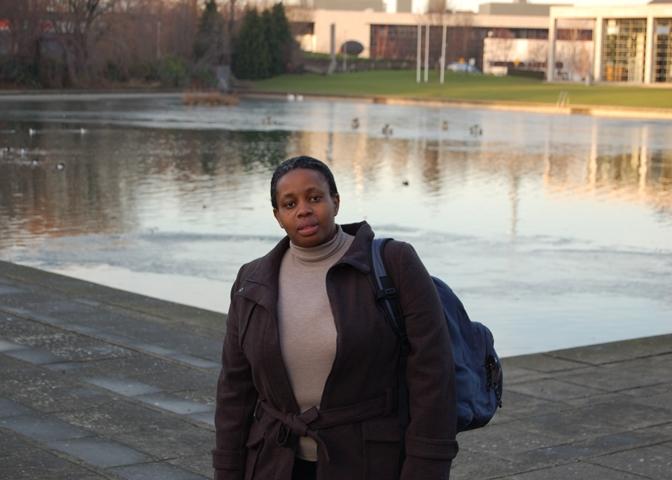Eunice Tumwebaze
(Uganda)
MA in Equality Studies, University College Dublin
Eunice received an Irish Aid Fellowship to undertake an MA in Equality Studies at University College Dublin. For the 2010-11 academic year, she took study leave from her role as Principal Community Development Officer at Mbarara Municipality where she was head of the Community Based Services Department.

My work will benefit from my having improved my writing technique, my argument, how to present a point, how to lobby, how to advocate. Also I will be doing it from a knowing view.
I work with the urban poor, vulnerable communities, people who are disempowered, usually left out, who may not know why certain things happen,” she explains. The Department is responsible for advising the council on issues of women, orphans and other vulnerable children, youths, persons with disabilities and older persons. This takes in all kind of issues, such as defending their rights and creating and developing projects for income generation. I’m responsible for helping my communities to come up with small projects that are funded by government and other donor agencies like the World Bank. Before my studies, l had started on the implementation of Community Driven Development of which over 30 community projects had benefited from government grants. Information I am getting indicates that community projects are doing well in the municipality.
This course has helped develop my critical thinking and analysis skills. I feel more empowered. Doing Equality Studies is teaching me some of the politics of why certain groups are left out, often with excuses of no funding, and who is in charge, who has the power and then I’m asking how can I empower my communities better, how can I inform my communities what they are entitled to. When I go back I must take key sections in our constitution and sensitise my communities in what the constitution says, that people do have a right. My role is to say ‘Look at how services are being delivered to you. Are you satisfied?’ Can we lobby more for the widows to be looked after better, for the children to be heard in a different way, for the HIV positive people to get better services? That’s why I chose this course and I think I’m moving in that direction. I’m challenged but I’m convinced this is the right way to go.
My work will benefit from my having improved my writing technique, my argument, how to present a point, how to lobby, how to advocate. Also I will be doing it from a knowing view.
Previously, I’ve been more in the office working but now I think it’s time for me to jump out and network better, speak to influential people on what is happening and try to get them to decide on improving the situation. I intend to do more community mobilisation and sensitisation and working in groups. I have learnt from Ireland about social movements. I’d like to promote that spirit. Alone, I cannot make it, but co-ordinating with colleagues we can do much, using the radio and the newspapers too. I will carry out research – participatory research - and talk about the findings, not for it to just go to the shelves but to be implemented and I’ll be using the techniques I’ve learnt here.”
In my dissertation, I plan to look more deeply at land rights for women in Uganda. I want to look at the attitudes, how we are treated, what is the law about property and inheritance, ownership, and what has been the impact especially in the area of productivity. Women are mostly in the production sector, are the ones involved in agriculture. How are women managing if they don’t have any rights to ownership? What is happening?
I look at myself as a big time advocate for human rights, not a critic but an advocate, saying ‘Can we improve on treating people differently? I would love to lobby for Uganda to reach a point of introducing the social welfare fund for the lone parents, for the old persons, for the orphans and other vulnerable children, for persons with disabilities, those most vulnerable should have something. I dream every day and I hope it happens. It can.
Update from Eunice - August 2015
I am now working as as an Assistant Commissioner Culture and Head of the Culture Division in the Ministry of Gender Labour and Social Development, Kampala. I contribute to the implementation of the Uganda National Culture Policy, trying to unleash the potential that culture and creative industries can have in the socio-economic development of the country. My role is to come up with innovative ways to use the culture sector to improve the livelihoods of the youth by making it more innovative and attractive.